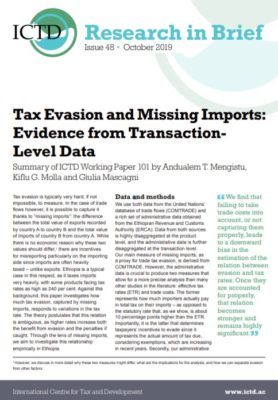Research in Brief 48
Tax evasion is typically very hard, if not impossible, to measure. In the case of trade flows however, it is possible to capture it thanks to “missing imports”: the difference between the total value of exports recorded by country A to country B and the total value of imports of country B from country A. While there is no economic reason why these two values should differ, there are incentives for misreporting particularly on the importing side since imports are often heavily taxed – unlike exports. Ethiopia is a typical case in this respect, as it taxes imports very heavily, with some products facing tax rates as high as 240 per cent. Against this background, this paper investigates how much tax evasion, captured by missing imports, responds to variations in the tax rate. The theory postulates that this relation is ambiguous, as higher rates increase both the benefit from evasion and the penalties if caught. Through the lens of missing imports, we aim to investigate this relationship empirically in Ethiopia. Summary of ICTD Working Paper 101 by Andualem T. Mengistu, Kiflu G. Molla and Giulia Mascagni.
